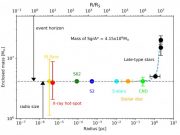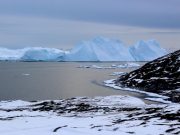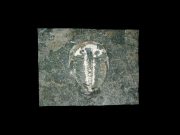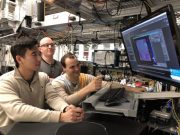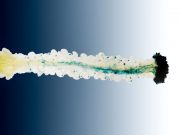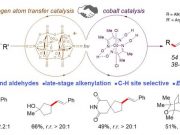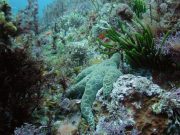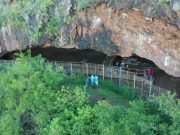Fastest star ever seen is moving at 8% the speed of light
In the center of our galaxy, hundreds of stars closely orbit a supermassive black hole. Most of these stars have large enough orbits that...
Warming Greenland ice sheet passes point of no return
Nearly 40 years of satellite data from Greenland shows that glaciers on the island have shrunk so much that even if global warming were...
Fossilised 429-mln-year-old eye mirrors modern insect vision
An exquisitely well preserved 429-million-year-old eye from a marine creature that went extinct before dinosaurs even existed had vision comparable to modern-day bees and...
Ancient genomes suggest woolly rhinos went extinct due to climate change, not overhunting
The extinction of prehistoric megafauna like the woolly mammoth, cave lion, and woolly rhinoceros at the end of the last ice age has often...
Scientists discover way to make quantum states last 10,000 times longer
If we can harness it, quantum technology promises fantastic new possibilities. But first, scientists need to coax quantum systems to stay yoked for longer...
New catalyst efficiently turns carbon dioxide into useful fuels and chemicals
As levels of atmospheric carbon dioxide continue to climb, scientists are looking for new ways of breaking down CO2 molecules to make useful carbon-based fuels,...
Black silicon photodetector breaks the 100% efficiency limit
Aalto University researchers have developed a black silicon photodetector that has reached above 130% efficiency. Thus, for the first time, a photovoltaic device has...
Team discovers a new role for a well-known molecule as a plant hormone
Researchers at the University of Maryland (UMD) have discovered an entirely new role for a well-known plant molecule called ACC, providing the first clear...
New method for late-stage functionalization of carbon-hydrogen bonds
National University of Singapore chemists have developed a photo-induced method for late-stage functionalization of carbon-hydrogen (C-H) bonds in organic molecules.
The replacement of H in...
Marine food webs under increasing stress
Scientists at the University of Adelaide have found growing evidence that marine ecosystems will not cope well with rising sea temperatures caused by climate...
200,000 years ago, humans preferred to sleep in beds
Researchers in South Africa's Border Cave, a well-known archeological site perched on a cliff between eSwatini (Swaziland) and KwaZulu-Natal in South Africa, have found...


